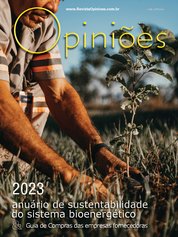Bertholdino Teixeira Junior
Corporate Sustainability Manager at Usina Coruripe
AsAA23
Is the sugar-energy sector sustainable?
In recent years, we have experienced extreme weather events like never before: heavy and excessive rains in some regions and drought and heat in others. There is no doubt about global warming and climate change. In this context, it is essential that we reflect on the role of the sugar-energy sector in this new era, in which environmental issues can influence the destiny of future generations more than ever.
For this analysis, it is necessary to revisit our past and how we have addressed environmental issues in our sector in recent years. I will focus on the recent past, when ethanol was incorporated into our production process, along with sugar.
Ethanol did not emerge in a low carbon footprint environment, much less in a green economy. It is important to note that ethanol was born as an economic alternative during a fuel crisis, when the price of gasoline became unaffordable. Therefore, in its origins, ethanol did not have a sustainable environmental footprint. In fact, at that initial moment, we even created an additional problem when dealing with vinasse, a residue that did not have many applications.
This context may explain why we still face difficulties today in convincing society that we are an environmentally sustainable sector. However, over time, we have evolved as an industry. Technologies and awareness have shown that the sugar-energy chain could be a sustainable and environmental alternative for the new times.
We learned to deal with our waste, which today is considered by-products of our production chain. Our industry has evolved technically with the use of control equipment and operational efficiency. Water consumption in our industrial operations has reduced considerably, to the point that we have become a closed circuit. Our air emissions now generate fertilizer, and the energy we produce has not only made us self-sufficient but also created economic opportunities by exporting to the distribution grid.
In the agricultural area, we have gone through a process of increasing productivity, associated with best practices in land use and occupation. The conservationist management of our lands has become a natural productive process. Our territory was reorganized, with environmental preservation areas and legal reserves recovered and incorporated into our assets.
So why are there still doubts about our environmental sustainability? The answer is simple and direct: times have changed. We are in the era of total decarbonization and the carbon negative industry. We can no longer support the discourse that we have already done our part for the environment or that we are "green". We need to continue improving our production processes and reduce our carbon footprint.
It makes no sense to apply so much nitrogen fertilizer or consume so much fossil fuel, just to name two examples. Not to mention our logistics chain in which diesel transports almost all of our production. We have to advance throughout our supply chain, it is important now that we monitor and monitor everything, in detail. It is not enough to just take care of our processes; we need to understand our entire chain, adopting the concept "from cradle to grave".
In response to the initial question of this essay, the sugar-energy sector is indeed sustainable from an environmental point of view, as it produces a renewable fuel, generates clean energy from biomass and is known to be more efficient in producing sugar than other forms. And the most important of all our products, we are a machine for removing carbon from the atmosphere.
All these characteristics qualify us for environmental sustainability. However, we are in an era of immediate, real-time information, accessible to the entire society. Therefore, we need to communicate our entire environmental commitment in an excellent and professional manner . In this new context of climate change, our role is to show society our true vocation and be proactive protagonists.




